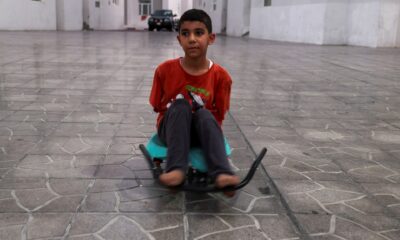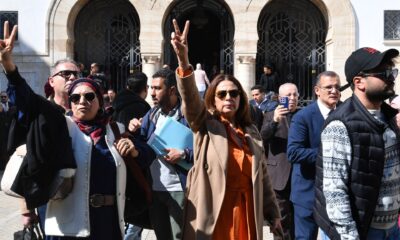Africa
Berlin faces colonial past as activists call for change

Mnyaka Sururu Mboro is still driven by the promise he made to his grandmother when he left Tanzania for Germany almost 50 years ago. Mboro told her he would recover the head of Mangi Meli, a king of the Wachaga people in eastern Africa, who was executed by German colonists for opposing their rule, and that he would bring it back to Tanzania to give the chieftain a proper burial. Mboro, now 73, is from the same area near Mount Kilimanjaro that Meli ruled. From 1885-1919, the region was part of German East Africa, a huge colony almost three times the size of present-day Germany.
Some years after he arrived in Germany – Mboro moved to Heidelberg in 1978 to study civil engineering and now lives in Berlin – he learned there was a so-called African Quarter in Berlin, a neighborhood where street names bore the names of German ties to the continent. Mboro said his initial pleasure turned to horror when he heard there was a street called Petersallee honoring Carl Peters, the first imperial commissioner for German East Africa from 1885-88 and arguably the driving force behind the establishment of the colony. “He (Carl Peters) liked to hang people just only most of the time for his joy,” said Mboro. Despite a campaign started in 1984 to have the name changed, it remained Petersallee until Aug. 23 of last year.
Mboro, who co-founded Berlin Postkolonial, a group pushing for a reappraisal of Germany’s colonial past and eradication of surviving colonial structures and racism, led a memorial procession as the long boulevard of Petersallee was split in two and renamed. One part is now called Maji-Maji-Allee to remember the Maji Maji Rebellion against colonial rule in German East Africa. The other part was named after Anna Mungunda, who fought against apartheid in Namibia, another former German colony known as German South West Africa. Germany lost all its colonies by 1918 after its defeat in World War I, but the impact of its colonial legacy lives on.
In 2021, Germany officially recognized its massacre of tens of thousands of Herero and Nama in German South West Africa between 1904 and 1908 as genocide. It stopped short of formal reparations. The authority overseeing Berlin’s state museums, the Prussian Cultural Heritage Foundation, or SPK, inherited a collection of some 7,700 human remains from Charité’s medical history museum in 2011. It has been trying to ascertain their origins for their return, but the process is proving difficult. Justice Mvemba founded Decolonial Tours in 2022, which offers tours of neighbourhoods and museums, including the Humboldt Forum.
Mvemba said some teachers may decide to tell students about the colonial era, but it’s often in romanticized ways. “The way these belongings displayed, they are more displayed as trophies and less as really like cultural belongings where people can actually come and learn something about, like the different nations,” she said.
Africa
Unprecedented trial for apartheid atrocities opens in South Africa

A significant step by South Africa’s legal system in confronting the atrocities of the country’s dark political past.
A judge this week approved the trial of two apartheid-era police officers for their involvement in the 1982 assassination of three student activists.
The prosecution is unprecedented. Until now, no individual had been held accountable for the crime of apartheid.
The case centers around three young freedome fighters killed in an explosion in 1982. The victims were part of a resistance movement opposed to the apartheid regime which enforced White-only rule and domination over the Black majority.
Experts say the trial could open the door for others.
Also this week, South Africa reopened an investigation into the death Albert Luthuli, a former president of the African National Congress (ANC) and Nobel Peace Prize laureate, who was killed in 1967.
The prosecuting authority seeks to have the findings of previous inquests into Luthuli overturned.
The authorities at the time had concluded that Luthuli’s death the result of an accident.
The development comes more than 30 years since South Africa became a democracy and after a Truth commission unearted numerous atrocities.
Africa
Tunisia jails opponents, critics of President Saied

Tunisia on Friday handed opponents of President Kais Saied lengthy jail terms after convicting them of plotting against state security.
Issam Chebbi and Jawhar Ben Mbarek of the opposition National Salvation Front coalition, as well as lawyer Ridha Belhaj and activist Chaima Issa, were sentenced to 18 years behind bars, their lawyer said.
Businessman Kamel Eltaief received the harshest penalty of 66 years in prison.
They are among forty people, including high-profile politicians, businessmen and journalists, who who were being prosecuted on security and terrorism charges.
Critics say the charges lacked merit, and only served to consolidate Saied’s power grab.
The president won re-election virtually unchallenged last year after the jailing or disqualification on flimsy grounds of his opponents.
Saied has ruled mostly by decree since dismissing parliament in 2022 and promulgating a revised constitution giving himself wideranging powers in 2023.
Africa
Tanzania opposition says jailed leader not seen by family, lawyers

Tanzania’s main opposition party said it had failed to get access to its leader who is in detention on treason charges.
CHADEMA said Friday that the family and lawyers of Tundu Lissu had failed to see him at a Dar es salaam jail where he had been kept since his arrest on April 9.
In a statement, the party said it held the Tanzanian government and Prisons Service responsible ble for Lissu’s safety.
The Prisons Service quickly denied that Lissu had been moved from jail.
In a statement, the agency dismissed CHADEMA’s concerns as misinformation.
“We would like to inform the public that Tundu Lissu is safe and he is still detained at Keko Prison in Dar es Salaam according to the country’s laws and procedures,” the Service said in a statement.
Lissu came second in Tanzania’s 2020 presidential election. Last week, he was arrested and later charged with treason after a speech demanding election reforms.
Prosecutors said the speech called for an uprising.
With another presidential vote on the horizon, critics say President Samia Suluhu Hassan’s government has ramped repression against the opposition.
This week, the election commission banned CHADEMA from taking part in elections after the party refused to sign a document pledging to obey the commission’s orders.
-

 Education2 days ago
Education2 days agoHarvard’s battle with the Trump administration is creating a thorny financial situation
-

 Sports2 days ago
Sports2 days agoAaron Rodgers ‘not holding anybody hostage’ as he decides his future, retirement a possibility
-

 Conflict Zones1 day ago
Conflict Zones1 day agoTrump says US may ‘pass’ on helping end war if Russia, Ukraine resist deal | Russia-Ukraine war News
-

 Conflict Zones2 days ago
Conflict Zones2 days ago‘How do I live like this?’ asks Gaza boy who lost arms in Israeli attack | Gaza News
-

 Middle East23 hours ago
Middle East23 hours agoTunisian court hands opposition figures lengthy jail terms | Human Rights News
-

 Europe2 days ago
Europe2 days agoTrump’s ‘lone ranger’: How Steve Witkoff became the defacto point man on America’s foreign policy challenges
-

 Lifestyle2 days ago
Lifestyle2 days agoFans of Superman relate to comic’s religious and ethical themes
-

 Europe2 days ago
Europe2 days agoLive updates: Trump news, Ukraine peace talks, US immigration, tariffs and university funding




